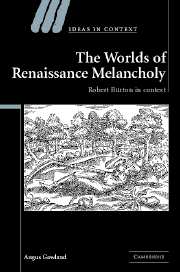Book contents
2 - Dissecting medical learning
Published online by Cambridge University Press: 13 January 2010
Summary
Despite the massive accumulation of medical learning in the Anatomy, Burton's authorial persona was not that of a physician but of a philosopher-divine, interested in and knowledgeable about medicine but with no pretence of being a practitioner. Indeed, he insisted that his book should not be used as a source of medical knowledge that could bypass the need for expert guidance. In the Subsection entitled ‘Physitian, Patient, Physicke’, he cited François Valleriola's warning against amateur self-medication, that ‘without exquisite knowledge’ for anyone ‘to worke out of bookes is most dangerous’, and related the example of ‘a friend of mine’ who upon ‘finding a receipt in Brassavola, would needs take Hellebor’, and who would have perished ‘had not some of his familiars come to visite him by chance’ (2.17.7–19 [2.1.4.2]). This was an appropriate health warning for a text that was aimed beyond the rarefied circles of the learned medical community, but it also reflected the manner in which Burton presented himself as an expert not in medicine but in philosophy and divinity. He was, as he wrote in the preface, ‘by my profession a Divine, and by mine inclination a Physitian’, having studied ‘the Theoricke of Physicke … not with an intent to practise, but to satisfy my selfe, which was a cause of the first undertaking of this Subject’ (1.23.5–10). This was an encyclopaedic investigation, as the book's subtitle indicated, of the medicinal, historical, and broadly philosophical aspects of melancholy.
- Type
- Chapter
- Information
- The Worlds of Renaissance MelancholyRobert Burton in Context, pp. 98 - 138Publisher: Cambridge University PressPrint publication year: 2006

